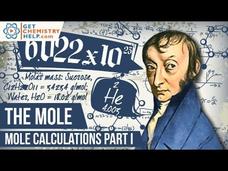Get Chemistry Help
Chemistry Lesson: Molar Mass
Enhance your current chemistry curriculum with a short video that demonstrates how to calculate the molar mass of a compound. There is also instruction for conversion between moles and mass, outlined in simple steps and demonstrated in a...
Get Chemistry Help
Chemistry Lesson: Mole Calculations I
Do your pupils already have knowledge of moles and mass? If so, this is the next step for the chemistry classroom. The video segment, while short in length, is filled with demonstrations on how to perform mole calculations involving both...
Get Chemistry Help
Chemistry Lesson: Determining Formula from Composition Data
Searching for a quick and thorough video segment to enhance your chemistry classroom? A step-by-step process determines the empirical and molecular formula of chemical compounds. A periodic table is required to properly integrate this...
Get Chemistry Help
Chemistry Lesson: Unit Analysis (Unit Conversions)
An informative video offers detailed instruction of the proper way to convert between different units in the English and metric systems. Additionally, it provides an explanation of how to handle significant digits and when this process...
Get Chemistry Help
Chemistry Lesson: Compound Unit Conversions
Searching for a way to enhance your classroom chemistry curriculum? A short video segment offers detailed instructions for how to convert compound units, such as miles/hour or milligrams/mL. The worksheet included prompts learners to...
Get Chemistry Help
Chemistry Lesson: Balancing Chemical Equations
An informative video segment describes how to balance chemical equations. It ensures pupils will obey the laws of conservation of mass and shares tips to assist young chemists who may need additional help to ensure a more simplistic way...
Get Chemistry Help
Chemistry Lesson: Types of Chemical Reactions
A descriptive video segment details five types of chemical reactions, including synthesis, decomposition, single displacement, double displacement, and combustion. It is engaging for even the most discerning young chemists.
Curated OER
Two more examples of solving rational equations
Rational expressions are the focus of this video, which completes Sal's lecture series on how to work with and solve the particular type of equation. The length of the video would be ideal for a computer lab visit or homework assignment...
TED-Ed
A Warm Embrace that Saves Lives
Millions of parents around the world must resort to ineffective, unsafe methods in order to keep their newborns warm. TED Fellow Jane Chen presents a new invention designed to address this problem, and concludes by calling for a "new...
Bozeman Science
Cell Communication
Humans have taken communication to every corner of the Earth, yet our bodies, at the cellular level, have communicated without technology for millions of years. Learners view the variety of ways cells can communicate, whether right next...
PBS
Career Connections | Software Developer Dayton
Like coding and 3-D design, like working with computers and with people? A career as a software developer might be in your future. Find out what's involved by watching a short video narrated by a software developer.
California Academy of Science
Renewable Energy: Clean Tech Solutions
Renewable energy originally found application more than 790,000 years ago. A relevant and engaging lesson explains some of the current options for renewable energy. Technology changes quickly and many different options provide hope for...
PBS
Career Connections | Chemical Engineer
Follow along with a chemical engineer at an oil refinery as he explains the many aspects of his work. Viewers learn about the processes and technologies these engineers use to turn crude oil into fuels and the other skill sets that are...
PBS
Exploring Careers in Health Science
For those who like to work with people on a daily basis, careers in the health sciences offer many options. A short video details many of these career options.
Curated OER
Reflection
Reflection is the bouncing of waves. Reflection can be used simply as entertainment or to guide ocean navigators. As your physics aces begin learning about waves, this resource would be valuable to show them that all of the different...
TED-Ed
How Does Fracking Work?
Fracking. The mere mention of the word invites controversy. Before joining the debate find out just what is involved in hydraulic fracturing with a short video that examines the technology involved in extracting natural gas found...
TED-Ed
Navigating Our Global Future
As we make great strides in technology in an increasingly globalized world, are we actually headed toward a century of eco-disaster and collapse? Listen as Ian Goldin, director of 21st Century School at Oxford, discusses the two...
TED-Ed
How Farming Planted the Seeds for the Internet
Is farming the greatest innovation in all of history? Watch as modern technology and advancements are traced back to the invention of farming in the Neolithic Revolution. The video illustrates how agricultural surplus led to division of...
TED-Ed
Visualizing the World's Twitter Data
Watch as Jer Thorp, former analyst for the New York Times, presents models of human behavior based on Twitter activity. Use the video to show your class the impact and scale of social media during a technology unit. The presenter is...
TED-Ed
How Batteries Work
Discover the fascinating technology that allows us to move around in our daily lives without being anchored to power cables. Learners trace the history of batteries and their ability to store charge back to the 1780s, and witness dynamic...
TED-Ed
Could Human Civilization Spread Across the Whole Galaxy?
Ever heard of von Neumann machines? These self-replicating machines could allow for the expansion of human civilization beyond Earth. The video describes how this type of technology could open many doors for exploration and life.
Physics Girl
Could You Replace Your Eye with a Camera?
Eyeballs or cameras—which have the best functions? The video presentations compare the important functions of the eyeball and the camera. As technology changes, cameras become more impressive, but the eyeball still out-functions the...
TED-Ed
Why Are Earthquakes so Hard to Predict?
Cell phones to crowdsource vibrations to warn of incoming earthquakes? Detectors to register high levels of radon-thoron isotopes? After detailing the factors that make earthquakes so difficult to predict, the narrator of a fascinating...
TED-Ed
How Close Are We to Uploading Our Minds?
What would it take to digitally upload someone's mind? A fascinating video first describes how a brain works, then looks at a future where people can live forever through avatars. The video describes the required technological advances...

























